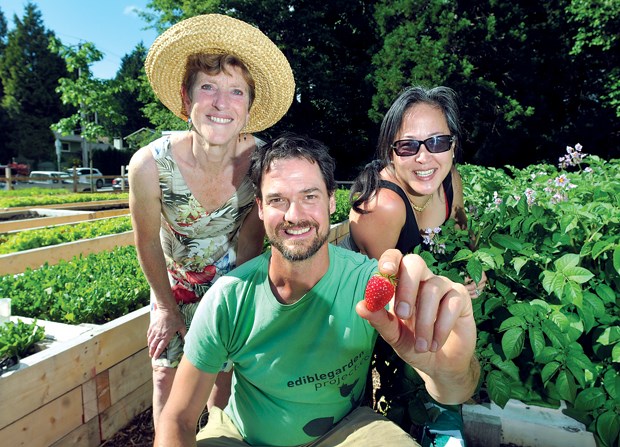The grassroots movement pushing for healthier food that has been growing around the world over the past decade is being led by a new kind of optimism and a sustainable set of ideals.
And Sutherland secondary is showing us one way to grow the movement with a local environmental initiative that may be a model for other schools to follow. The Sutherland Schoolyard Market Garden at 1860 Sutherland Ave., North Vancouver, officially opened on June 12 with local politicians, North Vancouver school district staff and representatives of sustainable food groups on hand. A first of its kind on the North Shore, the schoolyard market garden at Sutherland is intended to be an outdoor, green-learning classroom.
The garden's deeper purpose was eloquently summed up by Emily Jubenvill, manager of the Edible Garden Project at North Shore Neighbourhood House.
Jubenvill was busy with her duties at the garden's opening but managed some time to talk to me, explaining her perspective as we walked beside a long raised bed of organically grown carrots that swayed and shimmered in the late afternoon breeze.
"Schoolyard market gardens are outdoor, handson learning classrooms where school communities come together to learn about food systems, environmental sustainability, connection to the land and community," she said.
The market garden at Sutherland is approximately one-third of an acre in size and it's perched atop a little knoll in front of the school. It's an unassuming little plot of land with big potential to change the way children learn about growing healthy food, free from pesticides, in a sustainable manner that protects and enhances the soil and the earth.
During my K-12 education, learning about food consisted of obscure references in biology, botany or earth sciences and time spent learning how to cook in home economics. The same reality was more or less true for my children.
The new optimists, however, see the path to change through the minds of children.
"It doesn't take much to leave a positive impression on a child," said Dennis Charland of the Plant a Seed See What Grows Foundation (seewhatgrows. org). His organization works to create a "healthier generation through experiences that connect people to the land while providing opportunities to improve communities."
Charland was among the many community partners present at the opening, including Vancity, the Great Canadian Landscaping Company and Whole Foods. Along with the City of North Vancouver, Neptune Terminals, United Rentals, Holiday Inn Suites, Onni, Telus and the Real Estate Foundation of B.C. that also support the work of the Edible Garden Project.
The Sutherland Schoolyard Market Garden has so many supporters it's hard to thank them all, but one of the most vocal advocates for the project is Cynthia Bunbury who helped cut the ceremonial ribbon at the opening. Bunbury is a teacher at Sutherland and a firecracker of a lady with energy, enthusiasm and the courage to do something about a problem. At least that was my impression of her - her students may think differently.
As City of North Vancouver Mayor Darrell Mussatto said jokingly during his speech at the opening, "I know Cynthia well from the weekly emails she started sending me three or four years ago."
Bunbury started out teaching drama, English and French then changed to teaching social justice and came up with the idea to create a garden at the school to teach students firsthand about growing healthy food. Bunbury and Jubenvill have been working for some time to convince City of North Vancouver and North Vancouver school district officials to allow the garden's construction at Sutherland. For anyone who has not been involved in projects like the market garden, approvals involve funding sources, insurance requirements, security issues and ongoing operational concerns. But new ideas also require changing peoples' perceptions. One of the key approvals for the project came from Superintendent of Schools for North Vancouver, John Lewis. Lewis and Sutherland principal Ray Bodnaruk made a good decision to approve the garden and seem to have been reassured enough by Bunbury and Jubenvill that the garden will enhance education, not detract from it.
Bunbury's focus on the social justice aspect of the garden offers an intriguing thought: Is access to healthy, nutritious and affordable food a basic human right?
"Children need restorative experiences that connect them with the earth. They need to be connected with the soil and the food they eat to understand what healthy food means, and how to grow it sustainably," says Bunbury, who grew up on a farm.
Bunbury also commented that she thought current world food production was adequate to feed everyone if, "We would just stop wasting the 25 per cent of our food supply that is thrown away each year."
I applaud the North Vancouver school district and the City of North Vancouver for taking a chance on this project.
Perhaps our children can now learn how to grow healthy food more sustainably than past generations.
Email [email protected]



